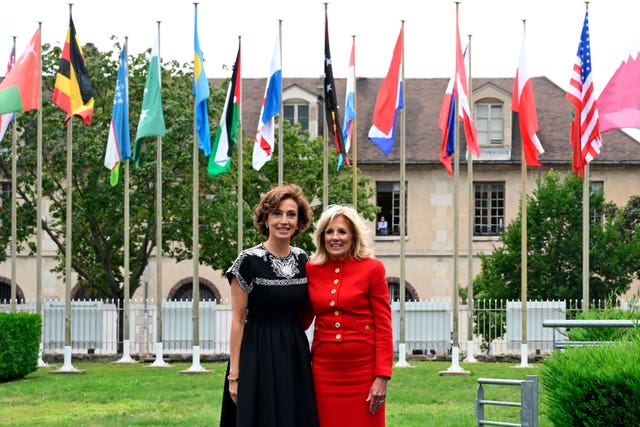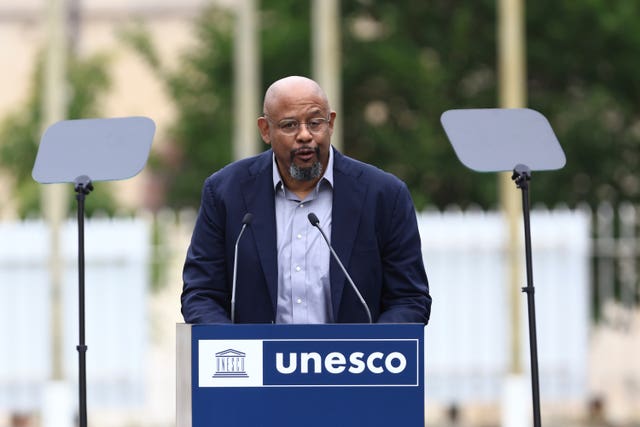Jill Biden marks US re-entry into Unesco with flag-raising ceremony in Paris
The Stars and Stripes was hoisted up outside Unesco’s headquarters with the Eiffel Tower on the skyline.

US first lady Jill Biden attended a flag-raising ceremony at Unesco in Paris on Tuesday, marking Washington’s official re-entry into the UN agency after a controversial five-year hiatus.
The Stars and Stripes was hoisted up outside Unesco’s headquarters with the Eiffel Tower on the skyline to rousing applause and a rendition of the national anthem.
Before the flag-raising, Mrs Biden made remarks about the importance of American leadership in preserving cultural heritage and empowering education and science across the globe.
“I was honoured to join you today as we raise the flag of the Unites States, the symbol of our commitment to global collaboration and peace,” Mrs Biden said.

“We are so proud to rejoin Unesco,” she proclaimed, acknowledging that “as a teacher I’m a little biased.”
The US had announced its intention to rejoin Unesco in June, and the organisation’s 193 member states earlier this month voted to approve the US reentry.
Tuesday’s ceremony, which also featured a speech by Unesco director-general Audrey Azoulay, formally signified the US becoming the 194th member — and flag proprietor — at the agency.
“We are putting the Star Spangled Banner back where it belongs,” Ms Azoulay said.
“In the time of divisions, rifts and and existential threats, we reaffirm our union here today,” Ms Azoulay also said, referring to current global political instabilities. “Together we will be stronger.”
“The return of the United States has a meaning that is bigger than Unesco,” she added.
Ms Azoulay emphasised the significance of the move for multilateralism and “universality” as a whole — in a speech that mentioned the war in Ukraine.
She said the momentum of Unesco will grow with the reintegration of the US, thereby strengthening the organisation’s initiatives throughout the world.
The UN agency’s special envoy, US actor Forest Whitaker, also gave a speech praising the spirit of peace through education that “could not have been possible without Unesco”.
The US decision to return to Paris-based Unesco was based mainly on concerns that China has filled a leadership gap since Washington withdrew during the Trump administration.
The US exit from Unesco in 2017 cited an alleged anti-Israel bias within the organisation. The decision followed a 2011 move by Unesco to include Palestine as a member state, which led the US and Israel to cease financing the agency. The US withdrawal became official a year later in 2018.

This represents a significant portion of Unesco’s annual operating budget of 534 million dollars (£415 million), highlighting the substantial financial role the U.S. played in the agency before its departure.
Before its withdrawal, the US was the single biggest funder of Unesco, contributing 22% of the agency’s overall funding.
This is the second time the US has returned to Unesco after a period of withdrawal. The country previously left the organisation in 1984 under the Reagan administration, citing mismanagement, corruption and perceived advancement of Soviet interests. It rejoined in 2003 under George W Bush’s presidency.





